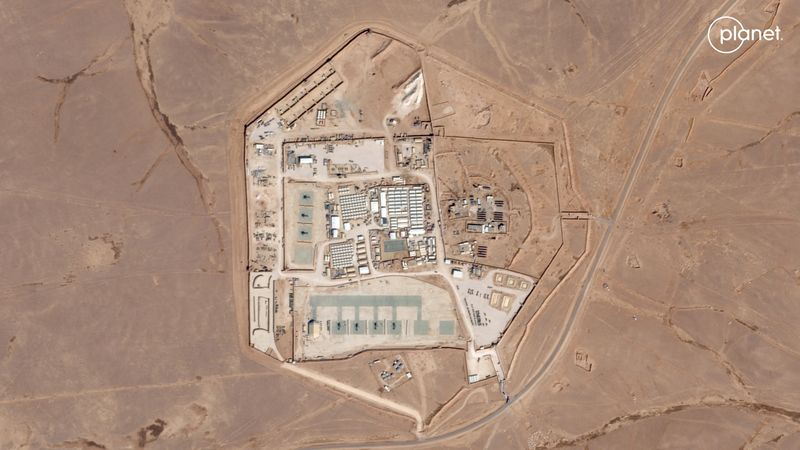WASHINGTON (Reuters) - The killing of three U.S. troops and wounding of dozens more on Sunday by Iran-backed militants is piling political pressure on President Joe Biden to deal a blow directly against Iran, a move he’s been reluctant to do out of fear of igniting a broader war.
Biden’s response options could range anywhere from targeting Iranian forces outside to even inside Iran, or opting for a more cautious retaliatory attack solely against the Iran-backed militants responsible, experts say.
American forces in the Middle East have been attacked more than 150 times by Iran-backed forces in Iraq, Syria, Jordan and off the coast of Yemen since the Israel-Hamas war erupted in October.
But until Sunday’s attack on a remote outpost known as Tower 22 near Jordan’s northeastern border with Syria, the strikes had not killed U.S. troops nor wounded so many. That allowed Biden the political space to mete out U.S. retaliation, inflicting costs on Iran-backed forces without risking a direct war with Tehran.



I think you have a fundamental misunderstanding about the point of a retaliatory military strike. The tit for tat bean counting with human lives isn’t even a large part of the calculus ultimately.
Not retaliating is seen as a sign of weakness which would serve to undermine NATO’s military stance of absolute first strike authority at anytime for any reason. Allowing Iran to attack US troops without a military response is relinquishing, in some small way, the US backed monopoly on violence. Right, wrong, or indifferent that is simply not something that will be allowed to happen.
Or how to keep global terrorism with a never ending supply of angry young people.
Fueling adversaries is good for the military sector.
We could give that whole thing a catchy name, like military industrial complex or something.
Your correct that military action does inflame people. But this action is trying to stop the people sponsoring the terrorist.
A better approach would be to stop sponsoring Israel’s genocidal war on Palestine. This would decrease tensions and allow diplomatic options to become viable.
Israel had a cease fire, which appears to have been motivated by the US pausing delivery of weapons to Israel. As soon as the weapons were delivered they went right back at it. So the US does have considerable influence.
The people doing these attacks in Yemen claim they are trying to disrupt Israel and it’s war on Gaza. Take away their moral cover and their support will weaken. They’ll be seen as terrorists if they don’t stop and will be politically easier to attack and politically harder to support.
And how did it work out so far? Terrorism is the result of dis-balance of power which makes terrorism the only viable method of resistance. You can’t solve terrorism with war. I like how you kind of managed to understand that in the case of Palestine/Israel conflict, but somehow stopped thinking right after that.
Nobody knows how to stop terrorism. There are a lot of hypothesis. However they are either untested in the real world, or they have failed.
You need to solve the underlying conflicts?
That is one hypothesis. While it sounds reasonable, we don’t actually know if it would work. We also have no clue how to solve the underlying conflicts. (Other than simplistic things like turning the entire middle east to glass - killing many innocent people in the process).
We could try, because we know that the alternatives don’t work for sure.
I would say that the bigger problem is that people in power don’t actually want to solve the conflicts at all.
Try which? I’ve seen many ideas, we cannot try them all. Some of the ideas have been tried as well, but the proposers don’t have enough history to know that or the results. Most of them will take decades to implement. This isn’t an easy problem.
Removed by mod